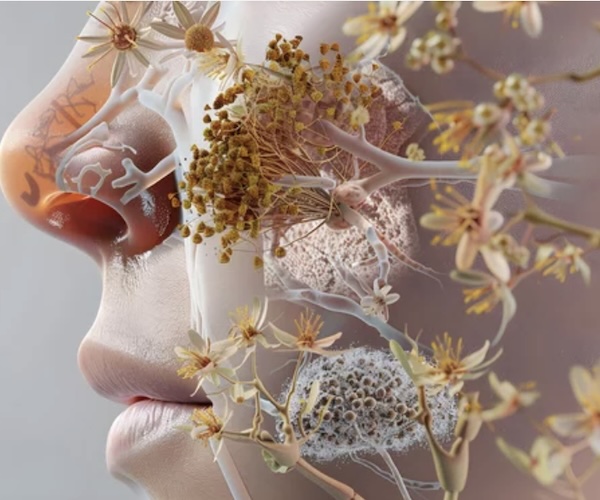
What is Allergic Rhinitis?
Allergic rhinitis, commonly known as hay fever, is an allergic reaction that occurs when the immune system overreacts to allergens like dust, pollen, mold or pet dander. It affects the nasal passages, causing symptoms such as sneezing, congestion, runny nose and itchy eyes.
What causes Allergic Rhinitis?
Allergic rhinitis is triggered when the body identifies harmless substances such as pollen or dust as threats. In response, the immune system releases histamines, leading to inflammation in the nasal passages.
- Pollen from trees, grasses or weeds
- Dust mites and molds
- Animal dander (skin flakes from pets)
- Pollution or smoke
- Sudden weather changes
What are the symptoms of Allergic Rhinitis?
Symptoms of allergic rhinitis may vary in intensity and can be intermittent or chronic. Common signs include:
- Frequent sneezing
- Itchy or runny nose
- Nasal congestion
- Watery or itchy eyes
- Postnasal drip (mucus in the throat)
- Coughing or throat irritation
- Headache or facial pressure
How is Allergic Rhinitis diagnosed?
- Clinical history – including symptom patterns and trigger exposure
- Physical examination – to assess nasal inflammation and other signs
- Allergy testing – skin prick tests or blood tests to identify specific allergens
What are the conventional treatments for Allergic Rhinitis?
Conventional treatment focuses on controlling symptoms and minimizing allergic reactions. Common treatments include:
- Antihistamines – to reduce sneezing, runny nose and itching
- Nasal corticosteroid sprays – to relieve inflammation and congestion
- Decongestants – for short-term relief of blocked nasal passages
- Allergy shots (immunotherapy) – to desensitize the immune system over time
- Saline nasal rinses – to flush out allergens and soothe nasal tissues
What lifestyle changes help manage Allergic Rhinitis?
- Limit exposure to known allergens
- Keep indoor spaces clean, well-ventilated and dust-free
- Use air purifiers to reduce airborne allergens
- Shower after outdoor exposure to remove pollen
- Practice nasal hygiene using saline sprays or steam inhalation
- Avoid smoking and strong fragrances, which can irritate nasal passages
Is there an ayurvedic treatment for Allergic Rhinitis?
Ayurveda provides a natural, root-cause-based approach to allergic rhinitis by addressing the imbalance of Kapha and Vata doshas, along with impaired digestive fire (Agni) and toxin accumulation (Ama).
Ayurvedic therapies for Allergic Rhinitis include:
- Nasya (Nasal Oil Therapy) - Medicated oils like Anu Tailam or Shadbindu Tailam are administered into the nostrils to cleanse the sinuses, reduce inflammation and restore respiratory balance.
- Vamana (Therapeutic Emesis) - A detoxification therapy to eliminate excess Kapha dosha from the upper body, especially effective for chronic cases with mucus buildup.
- Herbal Formulations - Herbs like Haridra (Turmeric), Tulsi (Holy Basil), Vasaka, Trikatu and Guduchi are used to reduce allergy sensitivity, boost immunity and support respiratory function.
- Steam Inhalation (Swedana) - Herbal steam with Eucalyptus or Camphor helps open nasal passages, relieve congestion and soothe irritated tissues.
- Dietary Guidance - Light, warm and Kapha reducing foods are recommended. Avoid cold, dairy-rich, fried or fermented foods that can worsen mucus and congestion.
- Rasayana (Rejuvenation) - Post detox, rejuvenating herbs like Chyawanprash or Ashwagandha may be prescribed to rebuild immunity and prevent recurrence.